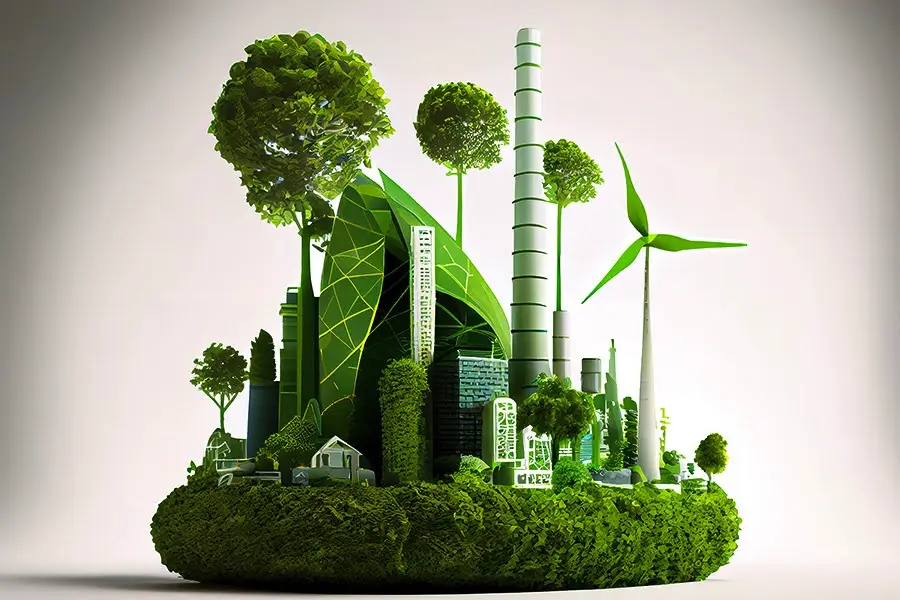We stand at a critical juncture in human history, faced with immense environmental challenges that demand urgent solutions. It is within this context that the significance of environmental engineering comes into focus. But what is environmental engineering, and why does this field matter?
At Cypress, we recognize that responsible growth requires more than just technical skills – it demands environmental foresight. That’s why in this article, we will demystify the role of environmental engineers in building a sustainable future. We will examine the responsibilities of environmental engineers across domains from water conservation to renewable energy.
Our goal is to illustrate how environmental engineering turns green ambitions into realities that advance society while restoring and preserving nature. Let’s explore this multifaceted field to discover how environmental engineers protect the planet we all call home.

What Is Environmental Engineering?
Environmental engineering, in essence, is the application of scientific and engineering principles to protect and improve the environment. This field focuses on developing innovative solutions to prevent and mitigate environmental issues such as pollution, resource depletion, and climate change.
The significance of environmental engineering cannot be overstated. In a rapidly changing world facing unprecedented environmental crises, this discipline acts as a guardian of our planet.
It aids in preserving our ecosystems, conserving natural resources, and enhancing the overall quality of life for present and future generations.
Environmental engineers are at the forefront of this endeavor, leveraging their expertise to design, implement, and manage projects that address various environmental concerns. From creating sustainable infrastructure to developing clean energy solutions, they are the architects of a greener and more resilient world.
Key Responsibilities of Environmental Engineers
Environmental engineers shoulder critical responsibilities that are pivotal in addressing environmental challenges and fostering a sustainable future. Their roles encompass a wide array of tasks that are instrumental in safeguarding the environment and the well-being of society.
Core functions of environmental engineers
Air quality management
At Cypress, our environmental engineers ensure that the air we breathe is clean and safe. They design, implement, and manage systems that control air pollutants and improve overall air quality.
This includes working on solutions like emissions control systems, air quality monitoring, and developing strategies to mitigate the impact of industrial and vehicular emissions.
Water resource protection
The protection of water resources is a core responsibility of environmental engineers. Our engineers work on projects related to wastewater treatment, water purification, and the management of water distribution systems.
This involves ensuring the availability of clean and safe drinking water while minimizing water wastage and contamination.
Waste management
Effective waste management is integral to environmental preservation. Environmental engineers design and oversee waste disposal and recycling systems to minimize the ecological footprint of waste.
They develop strategies for responsible waste disposal, promote recycling programs, and seek innovative ways to manage and reduce waste.
Sustainable development
Environmental engineers at Cypress actively contribute to sustainable development by designing eco-friendly infrastructure and guiding industries to adopt green practices.
These engineers are advocates for sustainable building techniques, renewable energy integration, and resource-efficient construction, all aimed at reducing the environmental impact of urbanization and industrialization.

Environmental impact assessment
Before commencing any significant project, environmental engineers conduct comprehensive environmental impact assessments.
These assessments are essential for understanding and mitigating potential harm to the environment. They help ensure that development projects adhere to environmental regulations and minimize their ecological footprint.
Their role in solving environmental challenges
Our environmental engineers are the problem-solvers of the environmental realm. They are at the forefront of developing innovative solutions to the most pressing environmental challenges of our time. Their expertise includes:
- Climate change mitigation – By working on the development of renewable energy sources and strategies to reduce greenhouse gas emissions, environmental engineers are instrumental in global efforts to combat climate change.
- Ecosystem preservation – Environmental engineers aid in the conservation of ecosystems by implementing strategies to protect habitats, restore degraded landscapes, and safeguard biodiversity.
- Public health protection – Their work directly impacts public health by ensuring the safety of water and air quality. Environmental engineers are champions of clean drinking water and air pollution reduction, which positively affect the well-being of communities.
- Sustainable practices – Our environmental engineers drive the adoption of sustainable practices in various industries, emphasizing the importance of responsible resource management and environmentally friendly technologies.
Environmental Engineering and Sustainability
Environmental engineering and sustainability are deeply intertwined. At Cypress, our environmental engineers are at the forefront of creating a more sustainable future for our planet.
They contribute towards this by developing and implementing solutions that help society meet its needs without compromising the environment.
Our environmental engineers promote sustainability by designing systems and processes that maximize resource efficiency, minimize waste and pollution, and reduce the overall environmental footprint.
Through innovative technologies and sustainable practices, our environmental engineers contribute to the responsible use of natural resources. We are dedicated to leveraging our expertise in environmental engineering to build a more sustainable world.
Environmental engineers contribute to a greener future
Environmental engineers are key players in building a greener future. They work on a wide range of projects aimed at mitigating environmental challenges and promoting sustainability. These professionals develop and implement strategies for cleaner energy, improved waste management, and pollution reduction.
By designing eco-friendly infrastructure, creating cleaner manufacturing processes, and finding innovative ways to manage resources, environmental engineers pave the way for a more sustainable world. Their expertise contributes to cleaner air, water, and soil, making life healthier and more harmonious for everyone.
Challenges and Opportunities in Environmental Engineering
Environmental engineering is a broad field that encompasses many disciplines and areas of focus. Here are some of the key challenges and opportunities environmental engineers face today:
- Climate change mitigation and adaptation – Developing solutions to reduce greenhouse gas emissions and help communities adapt to the impacts of climate change. This includes renewable energy systems, energy efficiency, resilient infrastructure, and natural climate solutions.
- Water resources management – Providing access to clean drinking water and sanitation, especially in developing countries. Managing scarce water resources amidst growing demand. Developing water treatment, conservation, and reuse systems.
- Waste management and pollution control – Reducing waste generation and improving recycling. Safely managing hazardous wastes. Developing technologies and processes to control air, water, and soil pollution. Remediating contaminated sites.
- Sustainable development – Designing infrastructure and systems that support economic and social development while minimizing environmental impact. Incorporating sustainability principles into urban planning and resource management.
- Environmental policy and regulation – Providing data, analysis, and expertise to inform evidence-based environmental policies. Ensuring compliance with environmental regulations.
- Public health protection – Assessing and managing environmental risks to public health, such as air pollution, contaminated sites, and chemical exposures.
- Ecosystem restoration – Developing solutions to restore degraded ecosystems, habitats, and biodiversity. Applying principles of ecological engineering.
- Emerging fields – Expanding into new cross-disciplinary fields such as green engineering, industrial ecology, and eco-informatics. Integrating sustainability broadly into engineering systems and business practices.
The environmental engineering field faces great challenges but also offers impactful opportunities to develop innovative solutions to pressing environmental problems. Environmental engineers will play a key role in building a more sustainable world.

Conclusion
As we have explored throughout this article, environmental engineering is a multifaceted field focused on protecting the natural world through the development of sustainable solutions.
By leveraging expertise across science, technology, and policy domains, environmental engineers at Cypress tackle the most pressing challenges facing humanity today – from climate change to pollution control. Their innovative and strategic thinking helps restore ecological balance while enabling societies to thrive.
We hope this overview has provided insight into what is environmental engineering and its vital role in building a sustainable future. The intricacies of the field may seem complex, but the fundamental aim is simple – to harmonize human progress and ecological health. As environmental pressures grow, there is an urgent need for the holistic, integrated perspective that environmental engineering offers.
